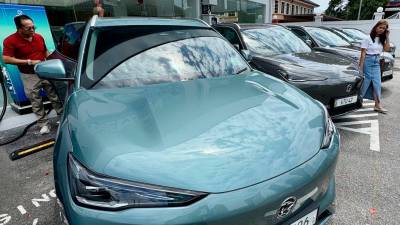PETALING JAYA: Malaysians switching to electric vehicles (EVs) will soon pay as little as RM20 – or as much as RM850 – in annual road tax under a new system starting in 2026, a move hailed as fairer by some but criticised as confusing and tilted towards the wealthy.
While the revised framework is seen as more affordable than the old formula, observers said its real impact will hinge on how well it is supported by infrastructure, fiscal incentives and ultimately a longer-term shift towards emissions-based taxation.
Malaysia EV Owners Club president Datuk Shahrol Halmi said members were “pleasantly surprised” at how much the new rates had been cut compared with pre-2022 levels.
“The Transport Ministry is using an escalating scale that links tax to motor power, which broadly tracks EV prices. Luxury EVs with higher output will pay more, while models in the affordable range, such as the BYD Atto 2 with its 130kW motor, will be taxed just RM120 a year,” he said.
He noted that the road tax in Malaysia functions less as a direct road maintenance fee and more like a “wealth tax”.
“The revised structure announced in June last year is clearly meant to nudge motorists towards EVs, with lower rates compared with similarly priced petrol vehicles.”
For example, Shahrol said a Proton X70 SUV would attract roughly twice the annual tax of Proton e.MAS 7 electric SUV, which comes in at about RM180 a year.
The difference, he explained, lies in how vehicles are assessed: internal combustion engine (ICE) cars are taxed on engine capacity, while EVs are taxed on motor output.
“They are two separate systems and the Road Transport Department must explain this clearly to consumers.”
USM transport expert Assoc Prof Dr Nur Sabahiah Abdul Sukor said the revised structure aligns with Malaysia’s Paris Agreement pledge to cut greenhouse gas intensity by 45% by 2030.
“Since EVs do not have engines, using motor power (kW) is globally standard. But against cubic centimetres-based ICE rates, it can feel like an ‘apple to orange’ comparison.
“ICE owners may feel unfairly treated unless the government explains this as part of a bigger plan to shift towards emissions-based taxation.”
She added that lower EV rates should only be a temporary incentive.
“If the gap is too wide, it distorts the market. Over time, Malaysia must move towards emissions-based taxation, which is both fairer and better for the environment.”
UiTM environmental economist Assoc Prof Dr J.S. Keshminder said the tiered structure, which charges higher rates for powerful EVs, currently benefits high-income households who dominate the market.
“The fairness question will only be answered once the government introduces complementary policies to help middle-income households, such as targeted subsidies and more public charging stations.”
He noted that while wealthier buyers may be spurred on by tax savings, many middle-class Malaysians remain deterred by high upfront prices and range anxiety.
“The success of this framework depends on a holistic approach that makes EVs genuinely accessible.”
Keshminder also urged the government to abandon capacity-based taxation altogether.
“It is outdated if our end goal is to reduce pollution. An emissions-based model would protect public health and make our auto industry more competitive.”
The government first introduced full exemptions on EV road tax, import duty and excise duty in 2022 to spur adoption. These will end on Dec 31 with the new rates taking effect the next day. Road tax will start at RM20 for the smallest entry-level models and rise to RM850 for high-powered EVs, depending on motor output.
